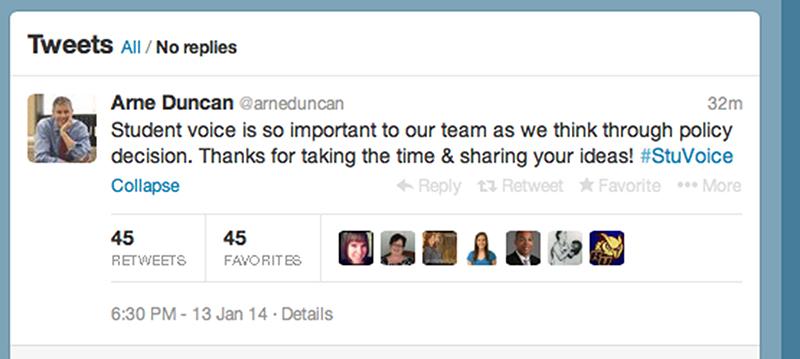U.S. Secretary of Education Arne Duncan told students during a Twitter conversation on Monday that college affordability measures taken by the Obama administration would increase “transparency” in higher education.
The plan, debuted last August, aimed to give individuals more information about college affordability by, in part, creating a public, value-based college ratings system. Duncan fielded questions from students over the proposed policy that has created confusion and received mixed reviews from students across the country.
The proposals included requests for states to contribute funds to public colleges based on the colleges’ ratings. The administration says the plan would both convince universities to improve their current courses and encourage students to earn a degree.
Duncan hosted the chat to encourage feedback from students. During the hour-long conversation, individuals asked questions ranging from how the government plans to prevent further tuition increases to how they propose to increase students’ options to pay back their debt.
One participant with the handle @alexdpratt tweeted that making postgrad employment information available to students would increase competition among colleges. Duncan responded emphasizing the importance of clarity and public information.
“Transparency will empower students and change behavior,” Duncan wrote.
Duncan asked questions about the most important qualities students need to know when comparing colleges. Individuals responded emphasizing the importance of including job placement rates in the new ratings system.
Duncan also asked the community how they would define the “value” of a college. One participant tweeted the value of college includes the extent to which it was made an available and viable opportunity for those who wanted to attend.
“That’s exactly our goal,” Duncan wrote. “That’s what motivates us. We have to fight for excellence & equity.”
Many of the concerns raised during the Twitter debate were shared by NU students.
Weinberg sophomore Parag Dharmavarapu, a member of NU’s College Democrats, said although the new ratings system will be helpful, the Obama administration needs to go much further with the proposals in order to make a noticeable difference.
“I think really what needs to happen is to decrease student loan and interest rates, and expand financial aid,” Dharmavarapu said. “That’s the best way to increase college affordability. I don’t think this proposal necessarily does a good enough job of doing that.”
Dharmavarapu said increasing transparency and the flow of public information will help individuals to make informed decisions but will not put tuition dollars in students’ pockets.
“I’m sure the proposal will be effective,” Dharmavarapu said. “I think it’s good but it doesn’t go far enough.”
Through the chat, Duncan emphasized the need to also improve high school education in addition to college and graduate school, and continued to ask students how they would guarantee a valid and reliable ratings system, encouraging more feedback from participants.
The proposed changes were a positive start to improving college affordability issues present in the United States, said David Peyton, a graduate student in political science.
“I think competition is a good thing, and increasing the information available to the public is positive,” Peyton said. “It’s informing young people about universities that are good deals, which is important.”
Peyton said many other countries provide more public money to make college more affordable. He suggested increasing the availability of public money would help cut the rising cost of tuition.
“Relieving debt for students should be a priority,” Peyton said. “With this ranking system, they are taking a step in the right direction and that’s what counts.”
Email: [email protected]
Twitter: @beccasavransky













